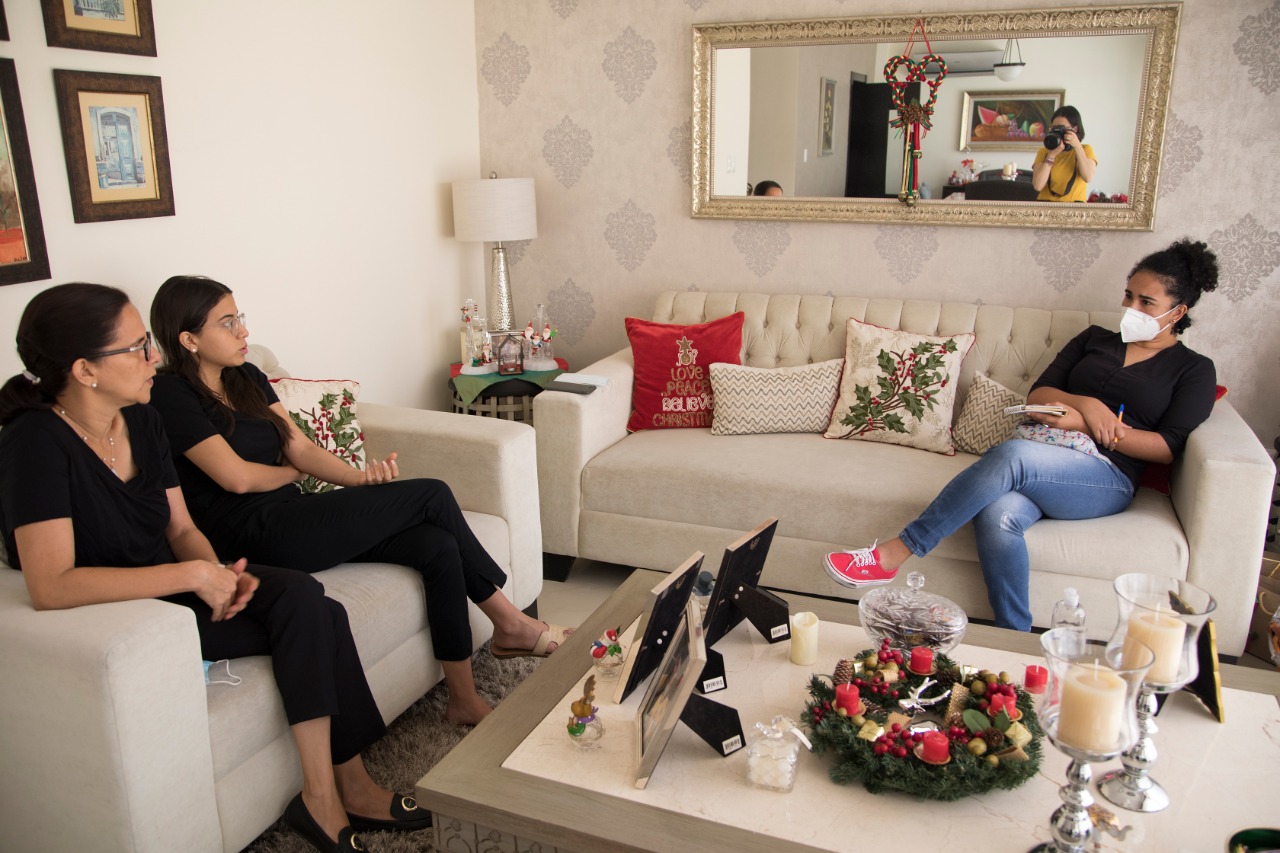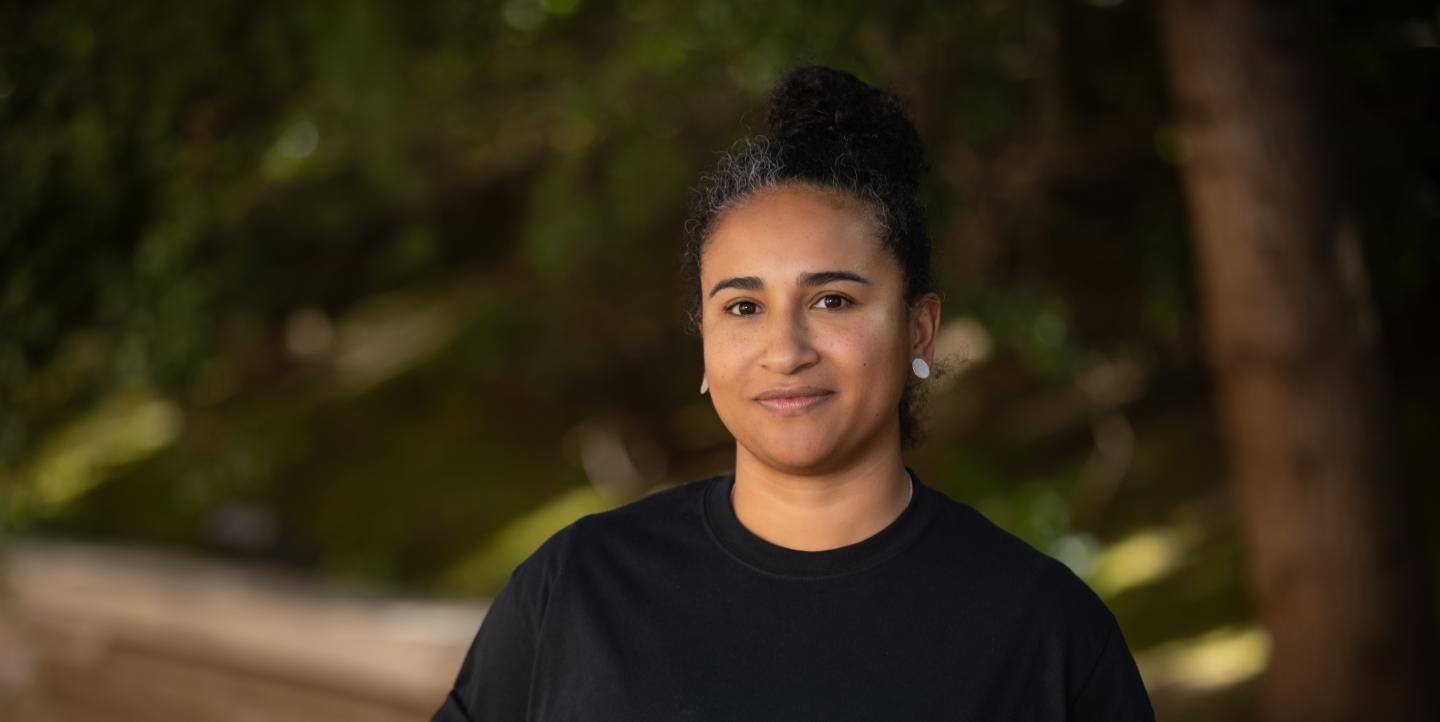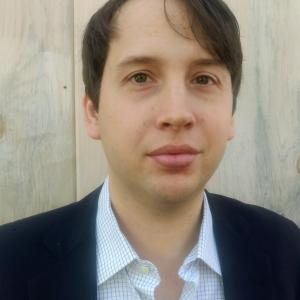Desirée Yépez is a journalist, fact-checker and author. Yépez, who is from Ecuador and resides in Palo Alto, California, covers a variety of topics related to vulnerable communities and human rights. She is currently a managing producer of national news at Radio Bilingüe.
Yépez spoke with IJNet about her background, the most difficult aspects of her job, Ecuador’s media environment, and more.
Here’s our conversation.
Would you tell me a bit about your background?
My story is that of a woman who grew up to live her childhood dream: telling stories. I remember watching the news with my mom and asking about those people who traveled to faraway places and spoke to different voices. “Journalists,” she told me. From that moment on, I kept repeating: “I want to be a journalist.”
Today, I proudly carry many identities – Afro-Latina, Ecuadorian, immigrant – and each one shapes how I approach journalism. I’ve dedicated my career to amplifying journalism as a tool for dignity.
As a reporter, editor, and fact-checker, my work has taken me across the Americas: I’ve reported on violence against transgender people during the Río 2016 Olympics; the fight for justice by Nicaraguan mothers under Ortega’s dictatorship; the public health crisis facing women who use crack in Brazil; the power of Afro-Mexican women reclaiming their place in the national narrative; or California’s debt to women: Don’t let domestic violence stay concealed in the home, to name a few.
My commitment extends to leadership and mentorship. I’ve led workshops and mentored journalists in Ecuador, Bolivia, Nicaragua, and El Salvador, confirming that a diverse, inclusive, reflective press is essential to hold power accountable and create change.
In 2022, I became the first Ecuadorian woman selected as a John S. Knight Fellow at Stanford. There, I focused on what it would mean to serve communities often left behind by traditional media, especially in the context of news deserts and the structural inequalities that fuel them, like limited access to information and education, which are barriers to fundamental rights.
Now, I’m writing a new chapter in the United States. After leading the National Direction of Digital Media at Ecuador’s public broadcasting system; consolidating Ecuador Chequea, the country’s first fact-checking outlet recognized by the International Fact-Checking Network; contributing to Radio Ambulante; and leading season two of Cruzando Líneas (Conecta Arizona’s podcast), I joined Radio Bilingüe as managing producer of national news. Since May 2025, I’ve led the digital transformation of this national network, the largest producer and distributor of Spanish-language content in the U.S. public media system.
Why did you decide to become a journalist?
I’ve known I wanted to be a journalist since I was a little girl, when curiosity was already shaping how I saw the world. I can’t forget those evenings next to my mom, watching the news and getting completely absorbed by stories that felt both distant and intimately close.
There wasn’t a single turning point, no big “aha” moment. It was a slow, steady fire. I grew up fueling that dream.
I was born in Esmeraldas, one of the poorest provinces in Ecuador, and raised in Quito, the capital. From early on, I learned what poverty and privilege look like and how they coexist. I saw how those contrasts shape lives, including mine. That instilled in me a purpose: to reach places and people that often feel unreachable, and to make their stories visible.
That’s why I became a journalist: I believe storytelling has the power to build bridges, challenge systems, and remind us of our shared humanity.

What’s the most difficult aspect of your job?
It depends on the context and stage of my career. When I started 15 years ago, one of the biggest challenges was the lack of representation in newsrooms, especially women in leadership roles who could serve as role models. Seeing racialized people in those spaces was even rarer.
Over time, I’ve had the privilege of crossing paths with extraordinary women whose leadership I admire and from whom I’ve learned, like Dawn García (JSK Fellowship), Carolina Guerrero (Radio Ambulante Studios), Silvia Viñas (El hilo podcast), and Maritza Félix (Conecta Arizona).
Perspectives on key issues have also shifted. When I began, reporting on gender-based violence as a systemic issue was a challenge; telling stories about LGBTQ+ struggles without bias or revictimization was rare. Finding expert voices within racialized communities was difficult.
Today, the challenges have evolved. Disinformation and polarization are shaking societies globally, creating new risks for journalists and audiences alike. In Latin America, the rise of organized crime and authoritarian governments poses real threats, sometimes life-or-death. In the Global North, working as an immigrant journalist, covering vulnerable communities in Spanish, often brings risks of censorship.
These are hard times for journalism. And yet, I believe there’s no better moment to be on the frontlines defending and advancing the human right to know.
How would you describe the media environment in Ecuador?
Ecuador was once among the most peaceful countries in Latin America, but today it ranks among the most violent. Organized crime, corruption, and authoritarianism have created a ticking time bomb, with journalists and media outlets at the center, attacked, censored, and silenced.
The safety crisis hitting citizens impacts journalists. Exile is increasingly common, as are threats, attacks, and even assassinations. Added to this is the profession’s precariousness: low pay, lack of protections, and limited support.
Though I left three years ago, my work remains grounded in Ecuador and a deep commitment to meaningful, rigorous journalism. Since 2020, I’ve led Desinformación y Elecciones: Combatiendo la infodemia, an initiative by Fundación Ciudadanía y Desarrollo. I designed a fact-checking training program that brought together Latin America’s leading voices to train over 100 journalists in underserved areas of Ecuador. In a country facing a public safety crisis, journalists’ ability to report on sensitive issues is vital to democracy.
Between 2022 and 2024, I also served as editorial director of Mullu.TV, where I co-created an investigative documentary format focused on Indigenous and Afro-descendant communities. More recently, thanks to DW Akademie, I’ve mentored local reporters through regional programs.
How has IJNet supported your work?
The opportunities I’ve discovered through IJNet have had a lasting impact. The following examples marked clear turning points in my work.
One of the most meaningful came in 2020, after more than a decade reporting on gender-based violence. Thanks to IJNet, I learned about a grant from ICFJ, which allowed me to create Silenciadas, a digital platform documenting femicide victims in Ecuador during the COVID-19 lockdown. Today, the project also exists as a book, a historical record supporting memory and justice.
IJNet also helped deepen my understanding of press freedom and broader threats to journalism across the Americas. Through the platform, I became a fellow in the first virtual diploma in press freedom offered by the Inter-American Press Society. There, I connected with peers reporting from some of the most hostile media environments, including Venezuela and Cuba, an experience that strengthened my regional perspective and advocacy.
IJNet has consistently pointed me to opportunities to expand my global outlook. One was the Elevate Scholarship, backed by the International News Media Association and Google News Initiative. It empowers underrepresented professionals, and helped me better understand how to navigate and contribute to the future of journalism.
Most recently, in 2025, I joined the Gwen Ifill Mentorship Program, an initiative by the International Women’s Media Foundation to address the lack of diversity in newsroom leadership across the U.S. Through this opportunity – discovered via IJNet – I’ve had the privilege of being mentored by Yvonne Latty, whose guidance is pushing to lead and thrive in a complex, often inequitable media ecosystem.
I’m also proud of the times IJNet has promoted workshops and initiatives I’ve helped lead.
What advice would you give to aspiring journalists in the United States?
Two years ago, I met the journalist and Nobel Prize winner Maria Ressa and asked her, “Why speak of advocacy when we speak of journalism?” Her resounding reply – “There are places where just doing journalism is activism” – became a personal mantra. No matter the context, journalism must serve as a vigilant guardian of democracy.
Photos courtesy of Desirée Yépez.
This interview has been edited lightly.


